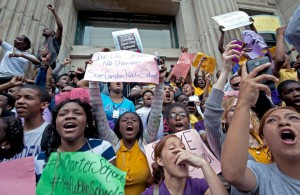Camden isn’t the only place where students are protesting and getting into the mix surrounding education politics. The Newark Student Union’s continuous effort to oust Cami Anderson caught a wave of publicity this week when they decided to stage a sit-in at a Board Meeting. Predictably, their political opponents claimed the event was coached by adults, something that is being whispered here in Camden as well. But that tactic of demeaning the civic efforts of students ultimately leads to bad PR, and its just plain bad strategy. Is there any way to get teenagers more invested and more involved than by telling them they aren’t individuals and are just puppets of adults? If you answered “by closing their schools and firing their teachers” you may be right. But there aren’t many better ways.
Good morning to the @NewarkStudents who r still sitting in this AM pic.twitter.com/PIPwABNMxk #ournewark
— EduShyster (@EduShyster) May 21, 2014
Ani McHugh laid out a defense of the Newark students, and Joseph Russell’s tweet summed up the defense in a poignant question:
@SteveDanley @teacherbiz31 @NewarkStudents Why don't ppl believe students, who are taught to think critically, can't think for themselves?
— Joseph Russell (@thegreengrass) May 21, 2014
The Newark students hardly needed the help. Not 24 hours had passed since the start of the sit-in, and only a few since the state-appointed superintendent’s aggressive press release, when NJ State Education Commissioner agreed to meet with Newark students. Not long after that, the President of the Newark Teachers Union sent out an email indicating that his meeting with the state, he was predicting Cami Anderson, Newark’s much-maligned superintendent, would be leaving.
This should be the benchmark for student protests in Camden. The goal is not a listening tour, as has been started by Camden’s own state-appointed superintendent. It should be changes to the things that are causing students to protest. “Listening” is only good if it serves as an agent for change; it should not be a mollifier to get student faces out of the news.
As I wrote before, students should be commended for their efforts to be civically engaged, and it should make us all pause that the people who bear the direct results (for 7 or 8 hours a day) of these policies feel so strongly about them. These voices are powerful because they are meaningful, but they are also powerful because they disprove so many of the narratives used to minimize the impact of protest. When entire high schools are walking out, and hundreds from multiple high schools are showing up at the Board of Education building to protest, they are not a “small group of critics.” Students aren’t “just trying to save their jobs” (a narrative we should be pushing back against anyway; do we really consider it a bad thing that talented educators who care about Camden want to continue working here?).
Most importantly, students are powerful. That’s why the Camden School District had to punish teachers, not students, for protests. That’s why the Newark Superintendent tried to claim students are being used as puppets. If students are really rising up against the system they’re entrenched in, if they really care so much for their teachers that they’re willing to unite in protest of layoffs and school closings, if they’re powerful enough to put the final nail in Cami Anderson’s coffin (after an entire mayoral race swung on her policies), if all that can happen in Newark, then imagine what students can do in Camden. The Newark Student Union’s defense of public education has to end in Newark.

Photo by April Saul in her collection Camden, NJ: A Spirit Invincible. Check out her facebook page.
The narrative that students don’t know enough to be able to see what is happening in their cities is wrong. To say that adults are just leading these children implies that adults should not be leading students to think for themselves, to question policies that lead to segregation, to blindly allow the pillage of their communities. These students are close to the same age that Vietnam protesters were. Where they blindly led by adults? Were they mistaken for what was standing up to fight against what was wrong?
What is happening today directly affects their lives and their futures. They have the right to demand to have input about decisions affecting them. We all have the responsibility to represent and guarantee their choices.
Much respect should be given to the parents and the teachers that have raised these young adults to make informed choices and to take action.